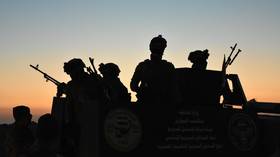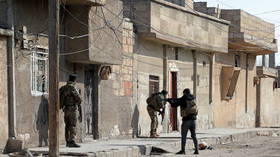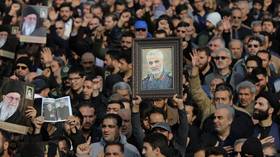Islamic State may have been forgotten, but they are not gone

Anyone remember Islamic State? For a time, they took over large swathes of Syria and Iraq, and their other activities included chopping people’s heads off and committing acts of terror. They were, for a while, front page news almost every day, dominating the TV channels and airwaves.
They also managed to export their warped ideology out of the Middle East, which led to a number of terrorist attacks across Europe, including in Paris, Brussels, Nice, Manchester, London, and many, many more. However, they are now, it seems, a footnote of history. Gone and forgotten by the Western media, as the news cycle turns to another foe… and we always do need a foe. For the last two years it was Covid, but now it appears to be shifting to an old favourite: Russia.
Though the mainstream media’s attention is currently focussed elsewhere, and the public is kept in a state of paranoia and high alert, Islamic State (IS, formerly ISIS) is still there, still active, and still dangerous. But these days, their attacks are happening in far away lands, and therefore they only warrant a cursory mention in our news – if they get a mention at all.
However, if anyone thought that Islamic State was a thing of the past, or had been eradicated, then the events of the past five days should put any thought of that firmly to bed. In that time, the group has launched numerous attacks in three different countries and has made threats which should act as a warning to us all.
Late last week, Islamic State attacked Al-Sinaa Prison in Ghwayran in the city of Hassakeh, northeast Syria. The facility holds around 5,000 prisoners, including some of Islamic State’s most hardened militants. The attack, by up to one-hundred Islamic State fighters, was preceded by a car bomb, which was aimed to coincide with an uprising in the prison. The objective was a mass prison breakout of the militants.
As a result, seven members of the Kurdish-led SDF were killed, as well as several militants. The only reason a mass prison break was prevented was through the support of air strikes, although fighting is continuing as I write. Some are now asking whether the audacious attack represents a resurgence in Islamic State and its capabilities.
Over the border in Iraq, Islamic State struck an Iraqi military base in the province of Diyala, a mountainous region north of Baghdad. They stormed the barracks, capturing the occupants unawares, and killed 11 Iraqi soldiers. It was another brazen act and has led to some to question whether the group is regaining strength.
Then we have a bomb blast in Herat, Afghanistan’s third-largest city, which killed seven people over the weekend, including four women. Although Islamic State has yet to claim responsibility for the atrocity, it is the prime suspect, having conducted similar operations in Afghanistan in recent times, including the bombing of Kabul’s passport office two days before Christmas.
Another Islamic State-affiliated group in West Africa also released a video last week showing young men and boys undergoing military training. These adolescents, aged between 12 and 18, will, the group claims, surreptitiously enter Spain and Portugal posing as migrants and unleash a reign of terror.
This goes back to the perilous state of Europe’s borders, and the strains which they are under. Hungary, for example, has claimed that it prevented over 122,000 people breaching its border last year. Expect that number to be even larger this year, when the full effects of the disastrous American withdrawal from Afghanistan are felt. And then, who knows who will be allowed onto the continent, or what their motives may be?
It is also estimated that around a thousand migrants have crossed the English Channel this month alone. None of them will have documents, and some will simply disappear into the ether. We have no idea who they are or what their intentions are. And although the vast majority will not wish to do any harm, recent history has shown us that a lone wolf is more than capable of sowing destruction and death.
In recent times, we have let our guard down regarding Islamic State. This is partly the fault of the media, which is obsessed with sensationalism, the here and now, and, for the moment, Russia. But we ignore Islamic State at our peril. If recent events are anything to go by, the group is still here, rebuilding, and remains a threat to every one of us.
The statements, views and opinions expressed in this column are solely those of the author and do not necessarily represent those of RT.















